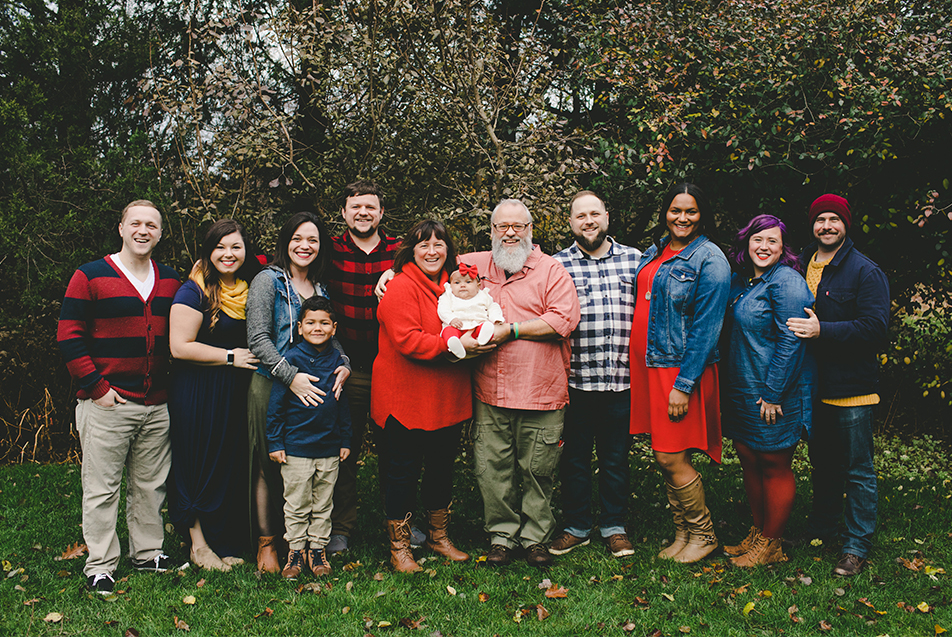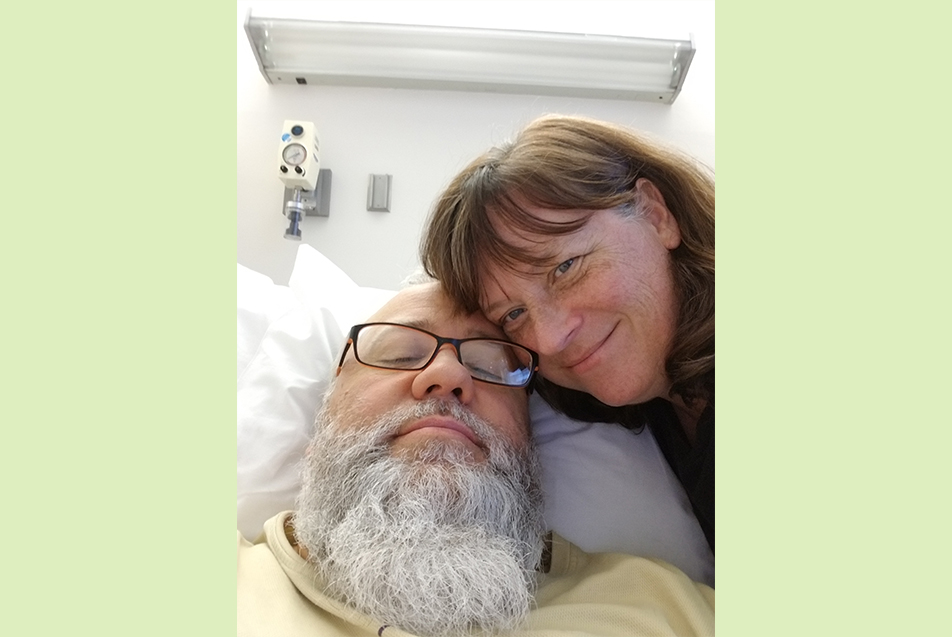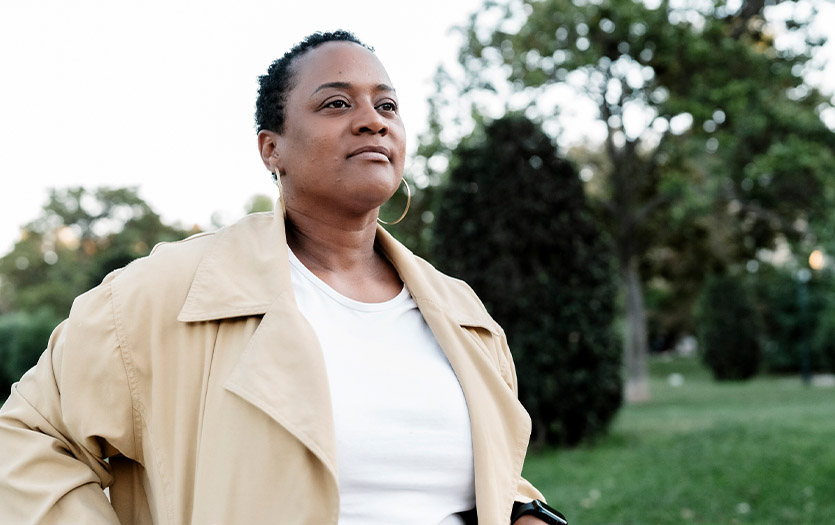
This story was shared by Michelle Kennedy, RN, Parkview Regional Medical Center, in honor of National Donate Life Month.
As a result of his diabetes, my husband Steve had a lot of liver damage. I kept an eye on his legs and kidneys, but I didn't realize that it could actually cause cirrhosis in the liver. As a result of his health complications, he also experienced some encephalopathy (damage to the brain). Over the course of two years, it got increasingly worse. Eventually, I had to have one of my sons and his wife move in so someone would be at home with him while I worked.
He had to take medication each day to purge the ammonia from his system, so that limited where he could go. It also created a problem where medications became toxic in his system. He had to stop taking metformin, the medication used to control his blood sugar, because of lactic acidosis. The encephalopathy would cause him excruciating headaches, to the point where he would hit his head to try and make it stop. At its worst, he would hallucinate and sometimes wouldn't even recognize me. When it wasn't quite to that point, he would become irritable and paranoid.
When Dr. Michael Grabowski, removed Steve’s gallbladder, he recognized that his liver was bumpy instead of smooth, so he went ahead and biopsied it. He explained to me after the surgery how serious this was and that Steve needed to see a specialist. We went on to see Dr. Gregory Scheible with Gastroenterology.
A turn for the worse
It wasn't until our youngest son’s wedding when we realized the extent of the damage. It was the night before, and Steve couldn't sleep. He was pacing around and asking why there were people in our room. At 6 o’clock in the morning I took him to Parkview Hospital Randallia and Dr. Nathan Allison checked his ammonia. It was 141. Normally the high end is 30. He gave him some medications and we made it to the wedding, though my husband doesn't remember the day. (He looks great in the pictures!)
At that point, Dr. Scheible gave him a referral to be evaluated for a liver transplant. He said it may not be yet, but he wanted them to know Steve’s name when the time came. We are so thankful for the detailed referral he provided. Our first appointment was in October 2016, and at that time Steve had to lose about 60 pounds before they would pursue adding him to the list. By the next appointment, in February 2017, he had lost the weight with the help of Dr. Scheible and the team at Parkview Weight Management & Bariatric Surgery. He was listed in June of 2017, almost a year after the first encephalopathy episode.
The wait
We tried to remain positive, but my dad wasn't doing very well. He lived in Upper Peninsula of Michigan, and we had to be able to get to Indianapolis within four hours. So we weren't able to go spend time with him. It was also a challenge managing the encephalopathy. There were a few really difficult times where he did irrational things, like locking everyone out of the house and randomly shaving off his hair and his beard. But we took it one day at a time. I have to say that my co-workers and supervisors at Parkview were so thoughtful and understanding during that time.

The call
We had an appointment on Monday with his heptologist in Indy. They use something called a MELD score to determine how quickly you need a liver, and his score was really low. That day he was at 11, and most patients don't receive transplants until they’re into the 20s. There are five things they score you on and then some exceptions. Steve got an exception for the encephalopathy, but everything else was normal that day, and he didn't need dialysis.
Thursday morning, April 26, 2018 we had a discussion about power of attorney for both health and finances because the encephalopathy was so bad. It wasn't but an hour after we had the paperwork filled out when he got the call. I was not prepared. In my mind that call wasn't coming. I walked in circles and cried. We knew it was a liver from Chicago and it was a cardiac death. We were heartbroken for the family who lost a loved one that day, but also so thankful for their willingness to donate to give my husband a chance to live a normal life again.
Recovery and setbacks
Recovery went fairly well. He was up walking the halls on Saturday and out of the Intensive Care Unit (ICU) on Sunday. Steve left the hospital the following Friday. He had follow up appointments two days a week for the first month, then weekly for a month, and biweekly for another month.
His liver enzymes started to go down but never got to normal. By August his bilirubin started to increase and he got a fever and an infection that landed him back in the hospital. For the next month, he was in and out of care and had several procedures to clean out his bile ducts. They then determined that the bile ducts were ischemic and failing. By mid-September they determined he needed to be listed again. This time, his MELD score was 23 and his skin was yellow.
It took two weeks for Steve to receive the second liver. On October 7, he got another call. This time I was much more prepared. My father passed away on October 10, and although Steve told me to go to the funeral, I wasn't able to be with my family. Thank goodness I stayed, because he went septic a week after the second surgery.
After getting through that infection, his liver enzymes went to normal range. He did have a small amount of time in November where they went up unexpectedly and his body was in rejection. They also found that his bile ducts were narrowing, which can happen after a transplant, but they were able to fix that with some stents. Since then, everything has been good.
Gratitude
We are so very thankful for the generosity of the donors and their families. The second donor we know was a neurological death, so it was most likely unexpected, and they were around the same age as our kids. My husband is writing a note to the donor families and we hope to someday be able to thank both of them in person. He also wants to make sure he doesn’t take the gift for granted. Steve wants to live every day to the fullest.
He is carefully monitoring and managing his diabetes, to prevent any further complications. We were able to go on a short vacation recently and plan on a trip with friends in May. He’s so grateful he gets to be a part of his grandchildren’s lives and to be able to care for them without fear of the encephalopathy. It’s unfortunate that something tragic has to happen for a donation to take place, but it’s amazing that a gift of life can come from that tragedy. You never know how that can ripple into so many other lives.
Learn more about how you can become an organ donor.



